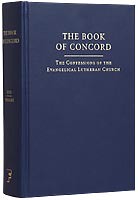the Book of Concord = my new best friend, haha. just kidding. kind of.
0 Comments Published by Brett on 16 February, 2009 at 6:30 PM.
It is such an understatement to say that I am enjoying the semester thus far. I feel busier and invigorated by what I am studying. Through a lot of thinking, experiences, and praying lately I've felt really affirmed to be who I am, stand up for things I think are important, and not be sucked into negativity that can sometimes surround being students. I love learning the things I am, and I am especially loving confessions class and pastoral care (and am in that class excitedly looking ahead to the challenge of CPE this summer).
Confessions with Dr. Wengert is powerful to me every day. I have had my Book of Concord for a few years now, but never really cracked it open for serious reading on my own outside the Catechisms. But I am really enjoying reading it. I am taking notes while I read, and each week we have these questions to kind of guide our reading and of which we have to choose five to write a paper on distilling a clear answer. The first topic was "What does justification mean?" Last week it was "According to Lutherans, why preach?" I wrote that one and by the end felt very refreshed and convicted of and in what I read and wrote. I am enjoying the practice of reading and writing for these questions which I think are central and practical for my/our future ministry. Also practical are the things which I am and will learn in liturgy class this semester. So far we are reading and writing on Gordon Lathrop's Holy Things - I have learned a lot from it including new ways to explain things about our life in liturgy/worship.
Tonight, I am writing again for confessions, this one is "why is there something wrong with the papacy?" But here follows my paper on "why preach?" which I got back today. (All the quotes are from the BoC.)
According to Lutherans, Why Preach?
We preach the gospel, in the pulpit or in proclaiming Christ in our daily lives, because God works through us in our preaching by the Holy Spirit to explain the mystery of faith, draw us into closer relationship, and so that all hear a word of grace which may comfort and make alive. So we preach because of what God did first and what God does through our preaching. We preach because we each are witness to the power of the gospel made alive and how it can work in our lives.
God's action and work in our preaching has primacy and thus ought be discussed first as groundwork for what is done in that work, the fruits of preaching. We preach because God gave us the Word, the holiest gift given to us above all others (LC 399.91). Whenever “God's Word is taught, preached, heard, read, or pondered, there the person, the day, and the work is hallowed, not on account of the external work but on account of the Word that makes us all saints.”(LC 399.92) So we preach because through the Word and the grace therein, God makes us holy; we are justified in the confident trust we take from the words of gospel spoken to us. This is so because of the work of the Holy Spirit, which “preaches to us and brings us to Christ.” (LC 436.37) God in the Holy Spirit draws us into Christian community for worship and hearing the word preached, which Luther makes clear in the Large Catechism is inseparable from our identity. That identity is as Christians who proclaim Christ crucified and risen, for us, that we might have confidence in his promise of merciful salvation. Yet this identity would be lost without the hearing and speaking the Word of God's grace, as the Holy Spirit works in us. Luther writes: “Neither you nor I could ever know anything about Christ, or believe in him and receive him as Lord, unless these were offered to us and bestowed on our hearts through the preaching of the gospel by the Holy Spirit.” (LC 436.38) Therefore, according to Lutherans, it is understood that we preach because we cannot help but to confess our confidence in God and that when we open our mouths to do so, it is God who speaks through us, for us.
The fruit of preaching is faith, confidence and comfort in the mercy of God, given by the Holy Spirit. This is enacted through preaching by the Holy Spirit and itself begs analysis and witness of how the spoken Word can transform our lives. When we preach as the scriptures do, words of honest law and gospel in community with other believers, the Holy Spirit “creates and increases holiness, causing it daily to grow and become strong in the faith and its fruits, which the Spirit produces.” (LC 438.53) Preaching, especially as Luther prescribes preaching on the catechism, ought to be simple, brief, and direct, so that it penetrates our hearts and minds and is remembered. (LC 386.27) When a sermon is preached so that the grace in it is simple enough to be remembered and pondered later, this gives the body of Christ a language by which to speak faith to one another. Furthermore, when we open ourselves as hearers of preaching and the Word, “we keep that Word holy and gladly hear and learn it.” (SC 352.6) Melanchthon brings clarity here – we preach, citing Galatians 3:[14b] “So that we might receive the promise of the Spirit through faith.”
Because God acts through our preaching and we witness to the power of preaching to impact our trust and relationship with God, we preach to give a specific message to all those that will listen. That message is the same as in the scripture itself – an honest declaration of the law that convicts as well as the joyful proclamation of the good news of God's promise. “In this way, Scripture makes a practice of joining these two things, terrors and consolation, in order to teach that these are the chief parts of repentence: contrition and faith that consoles and justifies.” (Ap 195.52) We as Lutherans preach a specific message, that which we define as gospel, that convicts us through the Holy Spirit as sinners and makes us alive through the promise of Christ. Not every message given from a pulpit or with a bible in hand fits these qualifications. But we witness to faith being effected in those who hear God in preaching, never on account of anything we do or choose, but on Christ's merit. (CA V.3) We know that we only come to relationship and understanding of our faith through the Holy spirit, so we are called to preach to explain and help our brothers and sisters in Christ. Luther writes in the Large Catechism that our entire gospel and preaching is dependent on our understanding of the second article of the Apostle's Creed, “so rich and broad that we can never learn it fully.” (LC 435.33) As Lutherans we preach and hear to learn and retain words spoken to us that are endlessly able to be examined, explained, and embraced, as part of our daily relationship with God.
So what begins with God ends with God here – we preach because God acts in, through, and for us, but also because we are commanded. We are called as Christians through the scriptures and by Luther and other witnesses to the faith to preach forgiveness and mercy, as we are all equal sinners, to the whole world. “We now want to return to the gospel, because God is extravagantly rich in his grace: first, through the spoken word, in which forgiveness of sins is preached to the whole world (which is the proper function of the gospels).” (SA 319.4:)



0 Responses to “the Book of Concord = my new best friend, haha. just kidding. kind of.”
Post a Comment